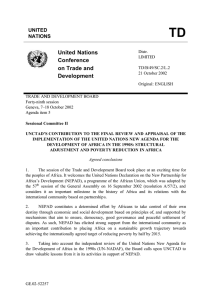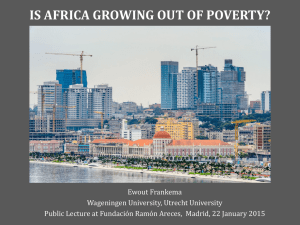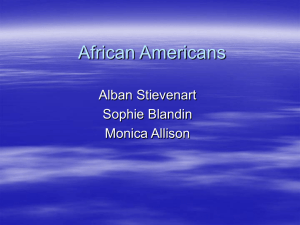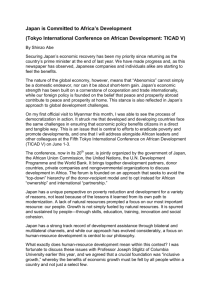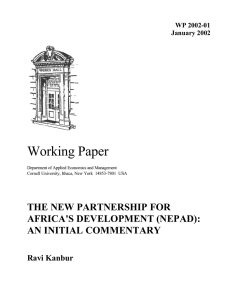TD United Nations Conference
advertisement
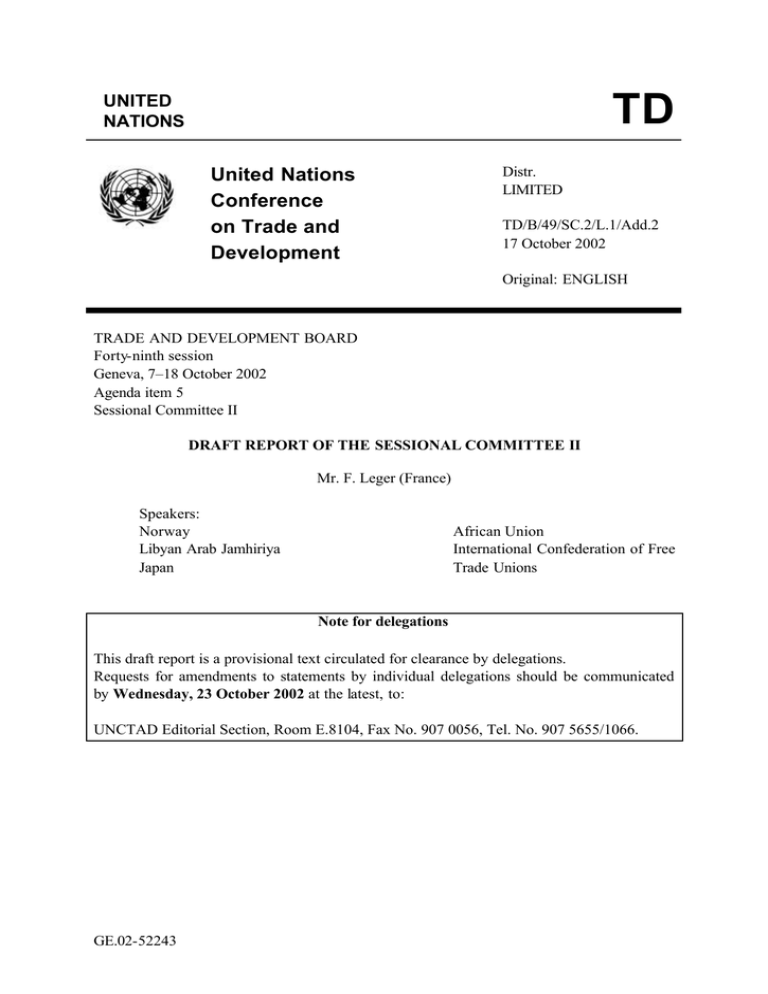
TD UNITED NATIONS United Nations Conference on Trade and Development Distr. LIMITED TD/B/49/SC.2/L.1/Add.2 17 October 2002 Original: ENGLISH TRADE AND DEVELOPMENT BOARD Forty-ninth session Geneva, 7–18 October 2002 Agenda item 5 Sessional Committee II DRAFT REPORT OF THE SESSIONAL COMMITTEE II Mr. F. Leger (France) Speakers: Norway Libyan Arab Jamhiriya Japan African Union International Confederation of Free Trade Unions Note for delegations This draft report is a provisional text circulated for clearance by delegations. Requests for amendments to statements by individual delegations should be communicated by Wednesday, 23 October 2002 at the latest, to: UNCTAD Editorial Section, Room E.8104, Fax No. 907 0056, Tel. No. 907 5655/1066. GE.02-52243 TD/B/49/SC.2/L.1/Add.2 Page 2 UNCTAD’S CONTRIBUTION TO THE IMLEMENTATION OF THE UNITED NATIONS NEW AGENDA FOR THE DEVELOPMENT OF AFRICA IN THE 1990S: STRUCTURAL ADJUSTMENT AND POVERTY REDUCTION IN AFRICA (Agenda item 5) (continued) 1. The representative of Norway said that economic policy that was responsible for hyperinflation, sustained fiscal imbalances, ineffective taxation systems and the absence of redistribution mechanisms did not benefit the poor, nor did artificial exchange rate policies, ineffective institutions or corruption. By contrast, investment, trade and growth could benefit the poor, but required a conducive economic and political environment. Policy reform and correction of economic imbalances continued to be of vital importance for growth and poverty reduction. However, economic reform alone was not sufficient to sustain poverty reduction, and reform processes were unlikely to succeed if imposed upon national Governments from abroad. Ownership was a prerequisite for success. In this regard, the New Partnership for Africa’s Development (NEPAD) could not be more timely. It provided for a genuinely African mechanism for promoting economic growth and poverty eradication. 2. It had gradually been recognized that poverty eradication and sustained economic growth required a strong focus on education, health, income distribution, social development and infrastructure. This was reflected in the continuous extension and improvement of the World Bank’s performance index in relation to lending and creditworthiness. The problem was not a lack of pro-poor policy advocated by the international financial institutions, but the implementation of better policies. Most stakeholders would agree that there was room for improvement in policy implementation; despite several success stories, there were indications that good policy intentions did not trickle down to the implementation level. 3. The work by the UNCTAD secretariat on adjustment policies in Africa was a welcome contribution to a frank and open exchange of views and experiences, something that was needed among all stakeholders. 4. The representative of the Libyan Arab Jamahiriya said that Africa was facing numerous problems and challenges. The persistence of foreign indebtedness was the most serious problem, since large debt service payments required many Governments to divert scarce resources from activities that were essential for accelerating development and the fight against poverty, such as spending on education and health services, and investment in infrastructure. So far, the HIPC Initiative for debt relief had not delivered the results hoped for. Its implementation was slow and the debt relief granted would in many cases be insufficient for achieving debt sustainability in the future. Also, there was a need to enhance the flow of foreign direct investment to African countries to help strengthen their productive base. TD/B/49/SC.2/L.1/Add.1 Page 3 5. African development was not possible without a strengthening of efforts by the international community to help the region overcome its structural weaknesses and to solve the problems of slow growth and poverty. However, regional efforts were equally important. In this regard, the transformation of the Organization of African Unity into the African Union constituted a substantial achievement on the path to sustainable development in Africa. It was also important that the UNCTAD secretariat continue to contribute to a better understanding of Africa’s development problems and to policy formulation through its research on issues of major importance for Africa. 6. The representative of Japan said that there would be no stability and prosperity in the world economy in the 21st century without a resolution of the problems in Africa. The Government of Japan had hosted the Tokyo International Conference on African Development (TICAD) in 1993, followed by TICAD II in 1998 and the TICAD Ministerial Meeting in 2001. TICAD III was planned to take place, at summit level, in October 2003. Japan had consistently stressed the importance of Africa’s ownership of development policies, which meant African initiatives and self- help, supported by partnership with the international community. Development could be sustained only if the countries concerned regarded the challenges as their own. In this connection, the demonstration of African ownership through the elaboration of the New Partnership for Africa’s Development (NEPAD) and the establishment of the African Union was an important step. 7. For the successful imple mentation of NEPAD, the TICAD process could play a catalytic role as a framework for a comprehensive dialogue and cooperation among African countries and their partners. At TICAD III, Japan would give priority to AsiaAfrica cooperation, human-centred deve lopment, and the consolidation of peace as a precondition for development. The UNCTAD secretariat’s report on economic development in Africa was right to stress the importance of education and health care, but it was also necessary to recognize that development efforts could not bear fruit without security and the consolidation of peace, an issue that deserved more attention in the future work of the secretariat. 8. The representative of the African Union said that the secretariat’s report on economic development in Africa offered an alternative perspective on the policies advocated by the international financial institutions. While it was too early to draw any conclusions about the impact of their new approach to growth and poverty reduction, the fact that particular importance was now given to country ownership and participatory decision- making in the design and implementation of poverty reduction programmes was a welcome development. The New Partnership for Africa’s Development (NEPAD) was a genuinely regiona l initiative through which Africa would pursue its interest in the world economy and engage in cooperation with the international community. At the recent meeting of the Trade Negotiations Committee of the WTO, many developing countries had complained about the lack of progress on issues of major interest to them, such as special and differential treatment, trade in agriculture and problems of implementation. All members of WTO had to show political commitment in order to ensure that the Doha Ministerial Conference would lead to positive results for development. TD/B/49/SC.2/L.1/Add.2 Page 4 9. The development objectives set out in the Constitutive Act of the African Union and its programme, NEPAD, could be attained only in a conducive external environment. It was with that in mind that African countries were participating in the WTO negotiations while aiming at stronger regional integration. If growth and poverty reduction goals as advocated by the Poverty Reduction Strategy Papers were to be attained, the multilateral trading system had to be reformed and development cooperation had to be strengthened. Developed country support was needed in the form of granting market access to products of export interest to African countries, implementing the existing debt relief initiatives and reviewing their eligibility criteria, and meeting the official development assistance target of 0.7 per cent of GNP. 10. UNCTAD should accelerate its delivery of trade-related technical assistance that could help strengthen institutional capacity, especially in Africa, and foster consensusbuilding in multilateral negotiations. 11. The representative of the International Federation of Free Trade Unions said that it was necessary to ensure the involvement of the peoples of Africa in the implementation of the New Partnership for Africa’s Development (NEPAD). African trade unions had continually voiced doubts about the notion that a free market approach to social and trade policy could solve the region’s development problems. Rather, development should be centred on democracy and participation, debt cancellation, strengthening of social protection and dialogue, and the promotion of peace and regional integration. The development models and schemes underlying International Monetary Fund and World Bank activities had not been able to solve the problems of poverty, unemployment and exclusion. The structural adjustment policies of the past had failed because they had not been based on democratic processes that took into account people’s real needs. _______
